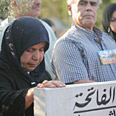
Film director: What about civil rights for Arab minority?
October’s Cry, a documentary on the killing of 13 Arabs during the October 2000 riots viewed through the perspective of the victim’s families, to be aired on Channel One Sunday. ‘When we began to film, as soon as the riots began, we knew that this was a milestone event, something that would be recorded in history,’ Director Julie Gal tells Ynetnews
October’s Cry, a documentary that explores the killing of 13 young Israeli Arabs by Israeli security forces during the 2000 riots and their aftermath, is scheduled to be aired on Channel One this Sunday night.
Viewed through the perspective of the victims’ families, the film also looks at the Or Commission of Inquiry, which investigated the events and the efforts of Arab lawyers and civil rights activists seeking justice for the victims.
According to the film’s producers, it will hit the festival circuit shortly before showing on international TV stations. The film is mainly in Hebrew with some English and Arabic spoken as well. It is subtitled in English, and there are versions with Hebrew and Arabic subtitles.
'Justice's opinion says it all'
October’s Cry received an honorable mention in the Wolgin Award competition in the Spirit of Freedom category for documentary films at the Jerusalem Film Festival last July, and was granted a special mention at the Nazareth Film Festival two weeks ago.
Speaking to Ynetnews, Director Julie Gal says she is pleased with the Or Commission’s findings, and agrees with their warning that that substantial work remains to improve Jewish-Arab relations in the country.
“I commend the judges for issuing this historical report; the main problem is with the follow up, what happens after,” she says. “Is enough being done, both by the government and civil society to safeguard the rights of the Arab citizens and improve relations between the two populations in Israel?
“A year after issuing the report that bears his name, Justice Theodor Or spoke before a Tel Aviv University audience and stressed ‘the ongoing discrimination against the Arab citizens of Israel in various areas and their aching sense of deprivation.'
"He went on to criticize the continuing failure of the treatment of the Arab citizens and the lethargic conduct of the Police Investigation Unit (Mahash). I believe the Justice's opinion says it all,” Gal states.
What was your main goal when you began production?
"When the demonstrations began inside Israel on October 1st, we felt this would become a milestone event, recorded in history, and we plunged in to film the events. I was lucky to work with two talented freelance cameramen, Colin Rosin and Ramez Kozmouz .ons. All of the riot footage, including the sniper shootings is authentic from October 1, 2 and 3 2000.
"As the Or Commission progressed I set out to make a documentary containing many viewpoints. We requested interviews from Israeli officials, including those in the police department. We were unable to obtain these with the exception of filming police patrols in Arab cities. Since the criminal case is still ongoing, we redrew our plans and came out with the first of a two part series.
"October’s Cry is a diary of the events as seen from the viewpoint of the Arab citizens. People will hear voices not always heard. And hopefully understand better the grief and rage of the population after the riots. Since two women tell the story it is also the voice of a minority within the minority. Some people say the film is one-sided and I say the film ‘shows one side that you do not always hear.’ We are mainly deafened by the shouting of politicians. Maybe this can help break stereotypes that people have."
What is your take on Jewish-Arab relations in Israel? Is there any hope for a better future?
"Justice Or in his lecture a year after the report was issued, spoke about the Commission's deep apprehension regarding the future of relations between Arab and Jewish citizens in Israel. I wouldn't disagree. Of course it depends also on the situation with our neighbors. If that improves so will the relations between Arab and Jew inside. But who knows when that will be?
"In the meantime we should be more active in ensuring the civil rights of 20 percent of our population. It’s a basic value that I as a Jew was brought up on. It starts with education, and listening to one another. I don’t expect a lot of agreement with the film’s protagonists, but maybe a little more understanding."
Gal's previous films include Islamic Fundamentalism & Democracy and the award winning biography of Shimon Peres, The Battle for Peace.










